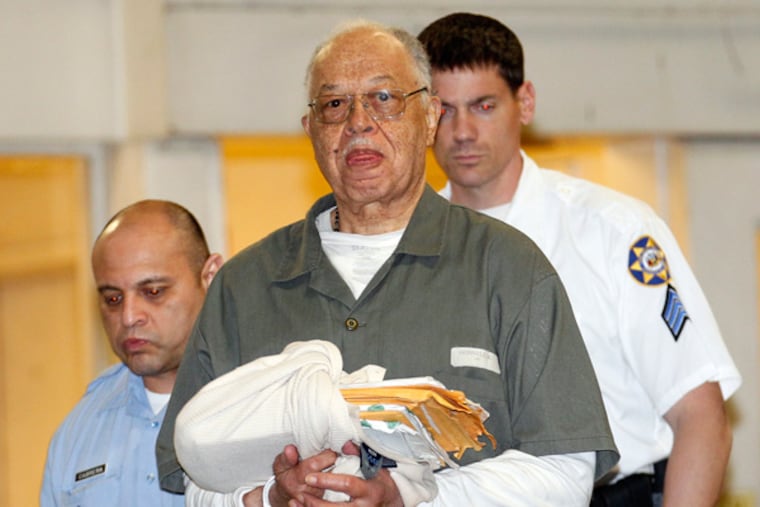Filmmakers hoping to make Gosnell story into TV movie
In some circles, one dares not speak about abortion, let alone create a film starring its most horrific practitioner: West Philadelphia's Kermit Gosnell, M.D.

In some circles, one dares not speak about abortion, let alone create a film starring its most horrific practitioner: West Philadelphia's Kermit Gosnell, M.D.
That taboo means nothing to the husband-and-wife filmmaking team of Phelim McAleer and Ann McElhinney. As the pair have proven in past productions, such as their documentary FrackNation, they are not afraid to swim against the politically correct cultural tide.
Amen to that, as church folks say.
The Gosnell case piqued the duo's interest while McAleer was in Philadelphia for the premiere of FrackNation in April 2013. Gosnell was then on trial, accused of slaughtering seven aborted-and-born-alive babies, and killing a mother, Karnamaya Mongar, at his Women's Medical Society abortion clinic. He was eventually convicted of murder in the deaths of three of those infants and one count of manslaughter for Mongar.
With a few free days in Philly, McAleer attended Gosnell's trial. While some people choose cheery pastimes on their days off, "I go to murder trials," McAleer quipped. It's an old habit that dates to his time as a crime reporter, when he covered the Troubles in his native Northern Ireland and tracked "drink/driving" cases in the local courthouse.
"As a journalist, I thought I knew a lot about abortion," said McAleer. At the trial, he learned more. "I did not know that abortions are performed at six months, that it was so unregulated, or what a 6-month-old baby [in utero] looked like," he added.
The "pictures of the [aborted] babies" had the most profound effect, he said. "People think graphic pictures that pro-life people show are Photoshopped. They're not. The pictures that I saw were court evidence. They were genuine," McAleer asserted. "If people saw those pictures, they would think twice about abortion."
McAleer was also stunned to count only three reporters at the trial of "America's biggest serial killer," as he calls Gosnell. Four reporters regularly covered drink/driving cases at the courthouse in Omagh, he added.
A closer look at the grand jury report on Gosnell led to the decision by McAleer and McElhinney to create and produce a TV movie about the case.
"We were struck by the politics of it all," said McElhinney, an investigative journalist whose past works include documentaries for the BBC and its Canadian and Irish counterparts. The couple had already learned much about the failures of state agencies while working on FrackNation, McElhinney added. "They say that they care about the people's health and the children," she said. "They don't. Gosnell got away with it for 17 years."
As the grand jury reported, some doctors in local hospitals knew about the botched abortions and that women from Gosnell's clinic were dying, McElhinney noted. She was haunted by the testimony of a neonatologist who said that a baby who survives an abortion feels "a tremendous amount of pain" as his or her spinal cord is severed.
Reading that candid grand jury report on Gosnell and the "reproductive health care" hellhole that was the scene of his crimes against humanity had the same effect on me.
Still, their film is "not just about the bad," said McElhinney. "We will also chronicle Philadelphia heroes, including whistle-blowers, women who changed their minds and had beautiful babies, police, prosecutors, and others."
McAleer and McElhinney began to raise money for the new film through crowdfunding on Kickstarter, as they had done with FrackNation. There, project creators set a monetary goal and a deadline, and site visitors pledge funds to make the dream a reality. FrackNation was made possible by 3,305 Kickstarter contributors who pledged $212,265, easily surpassing the original goal of $150,000. The duo have moved the Gosnell fund-raising to Indiegogo (at www.gosnellmovie.com) after disagreements with Kickstarter over the wording of their solicitation.
Currently, pledges range from $1 to $10,000, and McAleer and McElhinney are about a third of the way to their goal of $2.1 million. (If the goal isn't met, the money is returned to the pledgers.)
In "An Overview of Abortion in the United States," the pro-choice Guttmacher Institute reported this year that "most unsafe abortions occur in countries where abortion is illegal."
Most, but clearly not all. That's why the Gosnell story needs to be told, and why McAleer and McElhinney deserve our support.